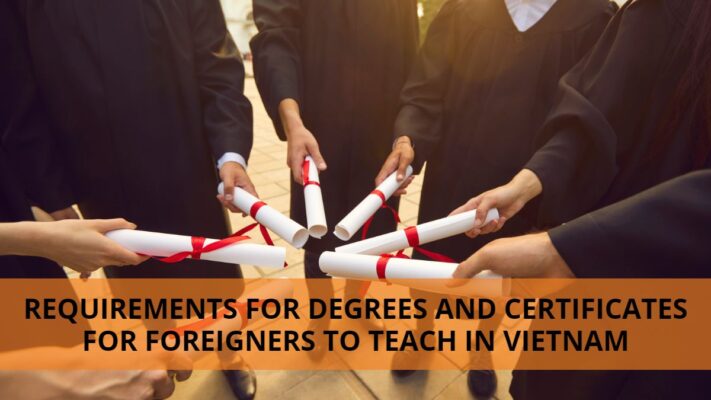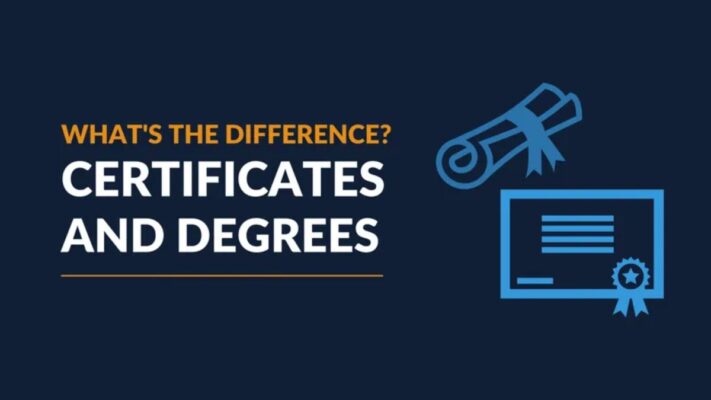Educational qualifications and teaching certificates are important criteria for evaluating a teacher’s competence. Let’s explore with EIV about Educational qualifications as well as the requirements for degrees and certificates for foreigners to teach in Vietnam in this article.
What are Educational qualifications?
Educational qualifications include degrees and teaching certificates that an individual obtains after completing specialized study and training programs. These certificates not only help individuals affirm their competence but also create opportunities for them to advance in their educational careers.
Are you a foreign teacher looking for teaching opportunities in Vietnam? Join EIV – the leading unit in recruiting and providing native teachers for centers and schools across the country. We are proud to provide a professional working environment, offering maximum support for you to reach your full potential and achieve success in your teaching career. Please contact EIV via hotline 028.7309.9959 for more detailed information.
According to regulations, foreigners are legally allowed to teach English in Vietnam if they have an appropriate teaching degree or a language/other specialized degree along with an appropriate English teaching certificate such as TESOL, TEFL, CELTA, DELTA…
Read more: Age Limits for Foreign Teachers in Vietnam: Key Regulations
Requirements for degrees and certificates for foreigners to teach in Vietnam

Requirements for degrees and certificates for foreigners to teach in Vietnam
Bachelor’s/Associate’s Degree
A Bachelor’s/Associate’s Degree is an important requirement to verify a teacher’s educational level. This degree should be related to the field of education or a corresponding specialization. Possessing an appropriate degree proves that the teacher has a solid knowledge foundation and ensures they meet teaching requirements.
Some necessary certificates
TEFL (Teaching English as a Foreign Language):
- Purpose: Teaching English to non-native speakers in countries where English is not used or where English is the main language.
- Requirement: English proficiency of C1 or higher.
- Can teach at schools, English language centers worldwide.
TKT (Teacher Knowledge Test):
- Purpose: Testing English teaching knowledge, suitable for new or experienced teachers.
- Requirement: English proficiency of B1 or higher.
- Teaching in countries where English is not the main language.
TESOL (Teaching English to Speakers of Other Languages):
- Purpose: Teaching English to non-native speakers, especially in Vietnam.
- Requirement: English proficiency of C1 or higher.
- Recognized in over 80 countries, a mandatory condition for teaching English at many schools.
CELTA (Certificate in English Language Teaching to Adults):
- Purpose: Training to teach English to adults.
- Requirement: English proficiency of C1 or higher.
- Widely recognized globally, especially at English language teaching centers.
DELTA (Diploma in Teaching to Speakers of Other Languages):
- Purpose: Advanced and in-depth English teaching.
- Requirement: English proficiency of C1 or higher, with at least 1 year of full-time teaching experience.
- Equivalent to a Master’s degree, for teachers wanting to develop an in-depth educational career.
Additionally, for European teachers, they need to prepare English certificates such as IELTS 6.0 or higher or CEFR certificates at C1/C2 level.
Teaching Experience
Some educational institutions require teachers to have at least 2 years of experience. Teachers can prepare detailed records of their teaching process, including courses taught, working time, and achievements.
Read more: Years of teaching experience required to become an English teacher in Vietnam
The difference between degrees and teaching certificates

The difference between degrees and teaching certificates
Degrees and teaching certificates are both important factors in educational qualifications, but they have distinct differences in purpose and training time.
What are Degrees?
Degrees are qualifications awarded by universities or colleges after completing a long-term study program. Degrees such as bachelor’s, master’s, and doctoral degrees are evidence that an individual has completed a certain level of education and has the ability to research or work in that field.
What are Teaching certificates?
Teaching certificates are professional certificates, usually awarded after completing a short-term course focusing on teaching skills. Certificates such as CELTA, TESOL, or TEFL are typical examples, helping teachers equip necessary skills to teach effectively, especially in teaching English to foreigners.
The importance of educational qualifications in education
Possessing high-level educational qualifications helps teachers not only enhance personal prestige but also meet stringent requirements from employers and educational institutions.
Improving teaching quality
Educational qualifications such as degrees and teaching certificates provide teachers with a solid foundation of knowledge and professional teaching skills, helping them convey knowledge more effectively. As a result, students can absorb lessons better, thereby improving overall education quality.
Creating more career opportunities
Teachers possessing high-level educational qualifications have opportunities to work at leading educational institutions, enjoy competitive salaries, and have the potential for career advancement. Degrees and teaching certificates are not only proof of competence but also important factors in achieving management positions in the education sector.
Meeting legal requirements and international standards
Educational qualifications are not only factors for evaluating competence but also help teachers meet legal requirements and international standards in the field of education. Possessing degrees and teaching certificates is mandatory for teachers to be allowed to teach in educational institutions. Moreover, these degrees and certificates also ensure that teachers comply with global teaching standards, making it easier for them when wanting to work or collaborate with international educational organizations.
In conclusion, Educational qualifications (degrees, teaching certificates) are not only determining factors of teaching quality but also the key to opening up many opportunities in an educational career. Choosing and improving these degrees and certificates needs to be done in a planned manner, suitable for each individual’s career goals. We hope this article from EIV has helped you better understand educational qualifications (degrees, teaching certificates) and how they affect your educational career.
 En
En Vi
Vi

